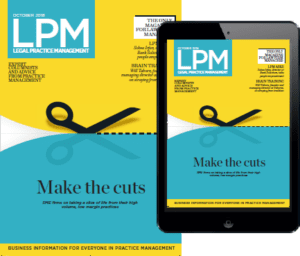
Small, specialist firms are taking on the world stage
Robert Coffey, managing partner at Cooke, Young and Keidan, says small, specialist firms are earning their place on the world stage by providing clients with an innovative, nimble, bespoke approach.
Small, specialist law firms are not a new thing. Indeed, it’s the global behemoth firms that are the more recent arrivals in the history of the practice of law. It may appear, at first sight, that the real difference between choosing a firm with a network of international offices versus a single-office specialist, is likely hourly rates. Often people think that, if they have an international matter, it makes most sense to go to a firm with offices in every relevant country. Not only are neither of these assumptions necessarily correct, but there are increasingly compelling reasons why the smaller specialist firms have been able to prove themselves as the best choice even for the most complex international matters.
Specialist firms can offer a conflict-free alternative to the largest firms, which may, for reason of actual or ‘commercial’ conflict, be unable or unwilling to act for a client on a particular matter. Indeed, specialist firms are often established by lawyers who have experience working in the largest firms, but who wish to offer a conflict-free alternative. And in addition to being conflict-free, the specialist firm may be able to act on matters where, for sanctions reasons, firms with a US nexus will be unable to act. The fact that a specialist firm may be single-office can be an advantage in an international matter. The specialist firm can pick and choose the best local lawyers with which to co-counsel on a matter, rather than being restricted to using only the offices within the firm’s own international organisation.
Small firms are ideally placed to take advantage of technology to level the playing field. They can identify and implement the technology most appropriate to a client’s needs at a speed that would be unthinkable at a large firm, and need not be tied to a narrow range of solutions. There’s a rapidly expanding range of software in the e-discovery and AI fields, for example, which can be implemented by even the smallest firms and which can greatly reduce the time, manpower, and cost needed to analyse large volumes of documentation. The experience of practicing law while subject to Covid-19 restrictions has proven, beyond doubt, that technology can play an even more central role than we may have previously thought. In litigation matters, hearings have continued remotely by video conference, including the giving of witness evidence from witnesses situated abroad. Much of the travel and requirement for in-person meeting previously thought essential has now been shown to be unnecessary.
Specialist firms are increasingly able to attract and retain the best talent from throughout the legal market. Junior lawyers are increasingly wary of becoming pigeonholed within a very narrow area of practice too early in their career (and thereby effectively becoming tied to a very large firm). They also actively seek out employment by specialist firms where they can expect to enjoy greater levels of responsibility at an earlier stage in their career, with less bureaucracy and more client contact. Overstaffing can be avoided by the specialist firm where everything and everyone – from software to lawyers – must earn its place on the client team.
Small, specialist firms are earning their place on the world stage by providing clients with an innovative, nimble, bespoke approach. A combination of the highest standards of legal practice and talent alongside a flexible approach to matter management has proved to be an unbeatable combination. Any small firm wanting to develop its international client base should think about how it can harness such existing strengths, and leverage existing or potential contacts in similarly-positioned overseas firms. This does not have to involve formal networks; having a deeper understanding of the strengths of possible collaborators in other countries will set a UK firm in good stead when international opportunities arise, as well as leading to broader potential for business development.
How strategic support from Miller secured a smoother insurance renewal

People over process: Staff induction during Covid-19
Robert Coffey, managing partner at Cooke, Young & Keidan, says remote induction of staff during the pandemic doesn’t have to be difficult, as long as you take careful consideration of the process.
The induction of new employees is inherently about people – introducing them to their workplace and how things are done there. The aim is, in equal measures, to ensure that procedures and processes are understood and followed, and to ensure that the individual feels welcomed and understands their role in their new workplace. Covid-19 has brought with it some significant challenges, and has changed how employers must do things. For most of us, some or all of the recruitment process has moved online. And as if that wasn’t enough, some employees have been coming on-board during lockdown periods and have started working from home without ever having met anyone from their new workplace in person.
Induction pre-Covid-19 was likely a mix of in-person and online training. In a world where induction may now be entirely virtual or remote, my top tips for success are as follows:
- Assign a mentor: a mentor can guide a new employee through process and procedure and, just as importantly, can help to pass on the firm’s culture (something that can easily be forgotten about when induction is not carried out in person).
- Ensure that the employee has the right home office equipment: this can be arranged in advance of the start date, and can really help a new employee feel well equipped for their new role. It’s not just the right computer that matters, but also the right chair, monitors, and any specialist equipment that may be required.
- Ensure that all mandatory training can be delivered online: it’s vital to go through a new-joiner checklist and ensure that no important training is falling through the cracks just because induction can’t take place in person.
- Arrange for virtual coffee meetings with the rest of the team: a mentor can play a very important role in helping a new joiner find their feet by facilitating as many introductions as possible to others in the firm, at all levels. These can be informal coffee meetings. Where meetings cannot be arranged, recorded messages of welcome may help establish the firm’s culture.
- Arrange for social events: a relaxed opportunity to get to know a group of people from the firm can be invaluable in helping to integrate a new joiner, and just because induction is remote doesn’t mean that this can’t happen. I have found that both existing and new employees really enjoyed the opportunity to spend some time together doing a quiz or attending a virtual music performance.
- Discuss Covid-19 with the employee, including their own particular concerns: this should be done at as early a stage as possible. An employee may have personal reasons for worrying about returning to office-based work, and new employees in particular may not know how to raise such issues. Where possible, a bespoke plan should be discussed with all employees – taking into account, for example, means of commuting safely to and from work. Training should be giving in Covid-19-safe use of the firm’s offices.
- Ensure that cybersecurity is paramount: this will be part of a new joiner’s training, but it’s worth double checking to ensure that the new joiner is accessing the firm’s systems in a way that is secure.
- Ensure that feedback is offered regularly: it’s important when we’re working apart to give regular meaningful feedback, as otherwise new joiners can feel very isolated and uncertain as to whether they’re meeting expectations.
Inducting staff during this tricky time certainly isn’t impossible – with the right organisation, processes and multiple channels of open communication it can be a smooth ride for new joiners and law firms alike. And hopefully in 2021 we can all embrace meeting face to face again.
How strategic support from Miller secured a smoother insurance renewal
Most Popular

Where are the challenges for SME law firm leadership changing?

The leading annual picture of SME law firms' changing strategic priorities
TA Triumph-Adler provides tailored support to meet compliance requirements

Law firms undertaking identity verification checks must register as an ASCP

Robust onboarding processes are fundamental to effective risk prevention

Osprey Approach's webinar explores the benefits of a digital-first approach


